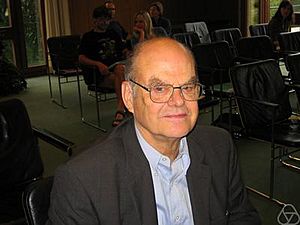John G. Thompson facts for kids
Quick facts for kids
John Thompson
|
|
|---|---|

Thompson in 2007
|
|
| Born |
John Griggs Thompson
October 13, 1932 Ottawa, Kansas, U.S.
|
| Education | Yale University (BA) University of Chicago (MA, PhD) |
| Awards | Cole Prize (1965) Fields Medal (1970) Fellow of the Royal Society (1979) Senior Berwick Prize (1982) Sylvester Medal (1985) Wolf Prize (1992) Médaille Poincaré (1992) National Medal of Science (2000) Abel Prize (2008) De Morgan Medal (2013) |
| Scientific career | |
| Fields | Group theory |
| Institutions | Harvard University (1961–62) University of Chicago (1962–68) University of Cambridge (1968–93) University of Florida (1993–) |
| Thesis | A Proof that a Finite Group with a Fixed-Point-Free Automorphism of Prime Order is Nilpotent (1959) |
| Doctoral advisor | Saunders Mac Lane |
| Doctoral students | R. L. Griess Richard Lyons Charles Sims Nick Patterson David Goldschmidt David Benson |
John Griggs Thompson (born October 13, 1932) is a famous American mathematician. He is known for his amazing work on a part of math called finite group theory. For his discoveries, he has won some of the biggest awards in mathematics, including the Fields Medal in 1970, the Wolf Prize in 1992, and the Abel Prize in 2008.
Contents
Early Life and Education
John Thompson was born in Ottawa, Kansas. He showed a great talent for math from a young age. He went to Yale University and earned his first degree in 1955. After that, he went to the University of Chicago to continue his studies. He earned his doctorate (PhD) in 1959. His main teacher was the well-known mathematician Saunders Mac Lane.
For his final project, called a doctoral thesis, Thompson solved a very difficult problem in group theory. This problem had puzzled mathematicians for about 60 years! His solution was so important that it was even reported in The New York Times.
A Career in Mathematics
After finishing his education, Thompson taught at the University of Chicago. In 1970, he moved to England to become a professor at the famous University of Cambridge. Later, he returned to the United States and joined the University of Florida.
Today, he is a professor emeritus at Cambridge, which is a special title for retired professors who have made great contributions. He also continues to be a professor at the University of Florida.
Solving a Giant Math Puzzle
One of Thompson's biggest achievements was helping to create the classification of finite simple groups. Think of this like creating a "periodic table" for math. Just as the periodic table lists all the chemical elements, this classification lists all the basic building blocks of certain mathematical structures.
In 1963, Thompson and another mathematician, Walter Feit, proved a very important idea called the Odd Order Theorem. Their proof was so long and complex that it took up an entire issue of a math journal! This work was a huge step forward and earned them the Cole Prize in 1965.
Discovering a New Group
Thompson's work led to the discovery of new mathematical objects. One of these is the Thompson group, often called Th. It is one of 26 special groups known as sporadic groups. These groups are unique and don't fit into the main families of groups, making them very interesting to mathematicians.
He also made important discoveries related to the inverse Galois problem, another very challenging area of mathematics.
Awards and Honors
Throughout his career, John Thompson has received many awards for his groundbreaking work.
- In 1971, he was elected to the U.S. National Academy of Sciences, one of the highest honors for a scientist.
- In 1982, he won the Senior Berwick Prize from the London Mathematical Society.
- In 1988, he received an honorary degree from the University of Oxford.
- In 2000, he was awarded the National Medal of Science, a top honor given by the President of the United States.
- He is also a Fellow of the Royal Society in London and a member of the Norwegian Academy of Science and Letters.
See also
 In Spanish: John Griggs Thompson para niños
In Spanish: John Griggs Thompson para niños
- Feit–Thompson theorem
- McKay–Thompson series
- Quadratic pair
- Thompson factorization
- Thompson order formula
- Thompson subgroup
- Thompson transitivity theorem
- Thompson uniqueness theorem
 | Bessie Coleman |
 | Spann Watson |
 | Jill E. Brown |
 | Sherman W. White |

